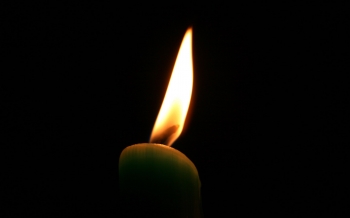The night was promising to be long as the first.
Autumn frosts where setting on the ground amid the evening mist. We had huddled in the temple with blankets and oil lamps for a full night meditation and chanting of the Buddha Name. There was a mix of scent of the smoky oil lamps and the sweetness of incense freshly lit in the incense holder on the small side altar. The image of Kuan Yin Bodhisattva flickered in the light of the candles. “Do you have enough oil for your lamp, Zhi Sheng?” inquired my Master. “You only need enough until daylight.”
“Yes, Master,” I replied. “The lamp has sufficient oil.” We arranged our blankets and settled ourselves. My oil lamp was placed just in front of me. It began to speak to me of renunciation, of ego. That night the oil lamp was to become my teacher.
Autumn frosts where setting on the ground amid the evening mist. We had huddled in the temple with blankets and oil lamps for a full night meditation and chanting of the Buddha Name. There was a mix of scent of the smoky oil lamps and the sweetness of incense freshly lit in the incense holder on the small side altar. The image of Kuan Yin Bodhisattva flickered in the light of the candles. “Do you have enough oil for your lamp, Zhi Sheng?” inquired my Master. “You only need enough until daylight.”
“Yes, Master,” I replied. “The lamp has sufficient oil.” We arranged our blankets and settled ourselves. My oil lamp was placed just in front of me. It began to speak to me of renunciation, of ego. That night the oil lamp was to become my teacher.
Our Ego is like the unlit oil lamp. Full of itself, full of oil, but of no use until it is alight. The Ego is that which identifies itself with the external world. Identity is very important to the Ego Self as it compares and discriminates. The key emotions of Ego Self are fear and pride. It is constantly stressed as it needs to be alert to any threat to itself and is constantly trying to fortify itself. It is about survival. Not that survival in itself is unimportant, but when we have sufficient resources for human survival, the rest is optional. There is a life beyond mere survival. But that is hidden from the Ego Self. The Ego Self maintains a human being in a state of spiritual and psychological defection. Our Buddha nature, on the other hand, promotes spiritual and psychological growth.
The little oil lamp unlit is like the Ego Self. It needs to give up its oil to come alight and give light to the darkness. This is the essence of Buddhism. The oil lamp renounces itself to give. Without being alight it has no meaning. It is nothing. When it is alight it truly becomes itself in what it was meant to be. So long as it hoards its possessions (the oil), it keeps itself in the dark and contradicts its true purpose.
As the morning light approaches we blow out the flame of the oil lamp not because we now reject the lamp but simply because it is no longer needed. It has made a natural transition. The morning light is now sufficient.
I know many who struggle with their ego self-cherishing nature. It is the ego which obstructs us from living a life of deep joy and happiness. It is the ego which discriminates, which judges, which sees itself as correct and others wrong. This ego has a clear self-identity. Yet it is in the illusion of a self-identity that we miss our true authentic identity, our Amitabha nature.
Many ask me how to overcome the obstruction of the ego nature. We have many good methods in Pure Land Buddhism. Prostrations is an excellent method as its very action of bowing, touching the earth with our heads down is a physical act of humility. It is one which quickly dissolves the ego nature. Prostrations may be done while reciting the Buddha Name. Chanting is also a good exercise! Furthermore, as we continue to meditate on and recite the Buddha name, gradually the light of our true Amitabha nature begins to shine through the cracks. These glimpses of illumination slowly peal through this old, worn out, and decaying room of the self-cherishing ego. The light will always displace the darkness.
Many ask me how to overcome the obstruction of the ego nature. We have many good methods in Pure Land Buddhism. Prostrations is an excellent method as its very action of bowing, touching the earth with our heads down is a physical act of humility. It is one which quickly dissolves the ego nature. Prostrations may be done while reciting the Buddha Name. Chanting is also a good exercise! Furthermore, as we continue to meditate on and recite the Buddha name, gradually the light of our true Amitabha nature begins to shine through the cracks. These glimpses of illumination slowly peal through this old, worn out, and decaying room of the self-cherishing ego. The light will always displace the darkness.















